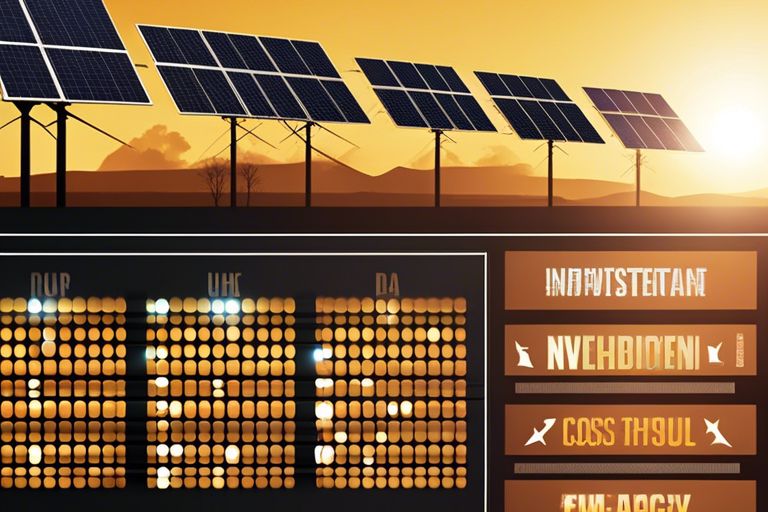Investment in energy sources is a crucial decision for individuals and businesses alike. With the rising concerns over climate change and the need for sustainable options, the debate between solar power and traditional energy sources intensifies. In this blog post, we will analyze and compare the pros and cons of investing in solar power versus traditional energy sources to determine which offers a more promising return on investment.

Overview of Solar Power Investment
Benefits of Investing in Solar Power
The adoption of solar power offers various advantages for investors. Solar energy is a renewable source, which means it can be harnessed without depleting natural resources. Additionally, investing in solar power can lead to long-term cost savings as solar panels have a lifespan of over 25 years with minimal maintenance required. Furthermore, solar power systems can increase the value of properties, making it a smart investment choice.
Costs and Considerations in Solar Installations
Investing in solar installations involves initial costs that can vary depending on the size and complexity of the system. Factors such as location, orientation, and shading can impact the efficiency and overall cost of the installation. It is crucial to consider the available incentives, rebates, and financing options when evaluating the overall investment in solar power.
Costs associated with solar installations include the purchase price of solar panels, inverters, mounting hardware, and installation labor. Additionally, ongoing costs such as monitoring, maintenance, and insurance should be factored into the overall investment. Despite the initial costs, the long-term benefits of investing in solar power can outweigh the expenses, making it a lucrative choice for many investors.

Examination of Traditional Energy Investments
Stability and Predictability of Fossil Fuel Investments
Some investors have long viewed investments in fossil fuels as a stable and predictable choice due to the established nature of the industry and the consistent demand for energy. Despite fluctuations in prices, fossil fuel investments have traditionally provided steady returns, making them attractive to risk-averse investors looking for a reliable source of income.
Environmental and Regulatory Risks Associated with Traditional Energy
On the other hand, traditional energy investments come with significant environmental and regulatory risks that are becoming increasingly prominent factors in investment decisions. Environmental concerns related to fossil fuels include air and water pollution, greenhouse gas emissions, and climate change implications, all of which can impact the long-term viability of these investments.
For instance, stricter regulations on carbon emissions and the shift towards renewables by governments worldwide could lead to increased costs and liabilities for companies heavily invested in traditional energy sources. Additionally, public perception and consumer preferences are also shifting towards more sustainable and environmentally friendly options, further challenging the future profitability of these investments.

Comparative Analysis of Returns
Short-Term vs. Long-Term Financial Performance
You may be wondering about the financial performance of solar power compared to traditional energy sources in both the short and long terms. While traditional energy sources may provide more immediate returns due to established infrastructure and low initial costs, it’s imperative to consider the long-term benefits of solar power. Over time, the declining costs of solar technology and the potential for energy independence can result in significant savings and a higher return on investment for solar power.
Impact of Government Policies and Incentives
Government policies and incentives play a crucial role in the investment attractiveness of solar power versus traditional energy sources. Solar power often benefits from supportive policies such as tax credits, rebates, and renewable energy standards that can offset initial installation costs and improve the overall financial performance of solar projects. In contrast, traditional energy sources may face challenges such as volatile fuel prices and increasing regulatory requirements that could impact their long-term profitability.
Performance-based incentives can also influence the financial returns of solar power investments. Programs like net metering, feed-in tariffs, and renewable energy certificates can provide additional revenue streams and enhance the economic viability of solar projects. By leveraging these government incentives effectively, investors can maximize their returns and contribute to a more sustainable energy future.
Market Trends and Future Outlook
Technological Advancements in Solar Energy
For decades, solar energy technology has been constantly evolving and improving. Advancements in solar panel efficiency, energy storage solutions, and smart grid technologies have made solar power a more reliable and cost-effective energy source. Innovations such as bifacial solar panels, solar tracking systems, and floating solar farms are pushing the boundaries of what is possible with solar energy generation.
Shifts in Global Energy Consumption and Demand
Advancements in technology, along with a growing awareness of environmental issues, are driving a significant shift in global energy consumption and demand. Traditional energy sources like coal and oil are facing increasing scrutiny due to their environmental impact, leading to a rise in demand for cleaner alternatives like solar power. As countries around the world commit to reducing carbon emissions and transitioning to renewable energy, the demand for solar power is expected to continue growing exponentially in the coming years.
Understanding these market trends and future outlook is crucial for investors and policymakers looking to make informed decisions about the energy sector. With the rapid advancements in solar technology and the global shift towards cleaner energy sources, investing in solar power infrastructure and research and development presents a promising opportunity for a sustainable and profitable future.
Conclusion
Summing up, investing in solar power is the better option compared to traditional energy sources for several reasons. Solar power is renewable, environmentally friendly, and can lead to significant long-term cost savings. With advancements in technology and increasing government incentives, solar energy is becoming more accessible and affordable for both residential and commercial use. As the world shifts towards sustainable energy solutions, investing in solar power is a wise choice that not only benefits the environment but also your finances in the long run.
